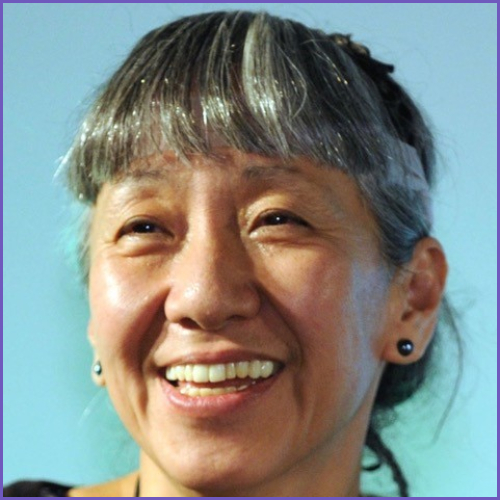This committee is no longer active as its responsibilities have been embedded into IfATE’s standard ways of working
Overview
The Green Apprenticeships and Technical Education Advisory Panel (GATE-AP) will provide IfATE with access to the independent expertise needed to deliver our green vision.
The GATE-AP operates at a strategic level within IfATE to fulfil the following key functions:
- monitor our progress against the commitments made in the Climate Change and Environmental Skills Strategy
- providing advice and challenge to our strategy on green skills, and to our overarching green activity to ensure our products are equipped to support the delivery of the UK’s net zero targets
The GATE-AP is supported by an advisory community of employers with expertise in a range of fields, known as the Green Advisory Community (GAC). If you would like to join the GAC, please email us.
Meet our members

Judy Ling Wong, Honorary President, Black Environment Network (BEN)
Chair
Judy is a poet, painter and environmentalist, best known as the Honorary President of Black Environment Network (BEN). She has an international reputation as the pioneer of an integrated approach to environmental engagement, bringing together social, cultural, environmental and economic concerns in the built and natural environment.
Judy’s work is marked by a philosophy of the leadership of many leaders, and fuelled by her closeness to the community, their needs and their aspirations. She was awarded an OBE for pioneering multicultural environmental participation in 2000 and a CBE for services to heritage in 2007. Judy is passionate about the vast potential of apprenticeships and technical education to contribute to the green recovery agenda.
You can find more information about Judy on her own website and on the Black Environmental Network website.

Jude L Capper, PhD ARAgS, Independent Livestock Sustainability Consultant
Vice Chair
Jude is the ABP Chair and Professor of Sustainable Beef and Sheep Systems at Harper Adams University (HAU) and is an independent Livestock Sustainability Consultant.
Jude's research focuses on modelling the sustainability of livestock production systems, specifically dairy, beef and sheep. She is currently working on projects relating to on-farm greenhouse gas emissions from UK beef and sheep production; the sustainability of smallholder farming; and the impacts of livestock health on system sustainability. Jude is a liveryman of the Worshipful Company of Butchers and Treasurer of the National Beef Association. She is also Chair of the Route Panel for Agriculture, Environment and Animal Care.
Jude has an active social media presence and spends a considerable amount of time de-bunking myths relating to livestock production. She was awarded “Dairy Industry Woman of the Year 2017” and “Farming Hero of the Year 2018”. Associate Membership of the Royal Agricultural Society was conferred upon Jude in 2018. In 2021, Jude was awarded both an honorary doctorate by HAU, and the Sir John Hammond Award by the British Society of Animal Science and British Cattle Breeders Club, in recognition of her contributions to the UK livestock industry.

Anna Nitch-Smith, COO, Cambridge Institute for Sustainability Leadership
Anna is a Chartered Environmentalist with over 20 years’ experience as an environmental expert. She is currently a Board Director at Waterman Infrastructure & Environment Limited, a multidisciplinary engineering consultancy providing sustainable solutions to the built environment sector. She works with a range of clients, including public and private sector property developers, infrastructure asset managers and developers, and construction contractors.
From 2018 to 2019, Anna was co-chair of the trailblazer group responsible for developing the environmental practitioner degree apprenticeship. She has a passionate interest in ensuring that the UK’s apprenticeship schemes provide access to the right talent needed to tackle global environmental issues such as climate change.

Denis Richard, Head of Major Programmes, Energy Systems Catapult
Denis is Head of Major Programmes at Energy Systems Catapult, an independent, not-for-profit centre of excellence set up to accelerate the transformation of the UK’s energy system. He is passionate about decarbonisation and developing solutions to overcome barriers to innovation and is currently leading the Catapult study on skills for net-zero. He also heads up the centre’s role in managing the Electrification of Heat Programme for the Department of Business, Energy and Industrial Strategy, aimed at better understanding and overcoming barriers to the large-scale roll-out of heat pumps.
Prior to this, Denis led the Smart Systems and Heat Programme, working with hundreds of households and a number of businesses and local authorities to develop real-world evidence on the key challenges facing consumers in the transition to low carbon heating and the potential of existing digital energy services. Before joining Catapult, Denis spent four years at Intelligent Energy working on fuel cells development and over 20 years in the automotive industry.

Dr Emma Wilcox, Chief Executive, Society for the Environment
Emma is the Chief Executive of the Society for the Environment, the chartered organisation responsible for the registration of environmental professionals. She has a strong academic research background as well as broad experience in business leadership, governance, strategy development, change management and small business delivery.
Having established the Energy and Efficiency Industrial Partnership and played key roles in the creation of two Skills Academies, Emma has broad experience of the challenges and opportunities presented by apprenticeships. She is passionate about accessible education for all and recognises the critical role of education in addressing climate and environmental emergencies.

Gareth Williams, Managing Director, Caplor
Gareth has a deep-rooted and evolving passion for the sustainability agenda. Building on his family farming roots in Herefordshire, he has developed a diversified, rural enterprise that now includes a renewable energy business, property rental and farming activity. Three generations of the Williams family have operated from Caplor Farm since 1923.
Having graduated with an agricultural degree in 1990, Gareth has continued to pursue development opportunities and activities that reflect his wide-ranging passions, including leadership and management, counselling, public speaking, and UK and overseas energy and sustainable-based consultancy. Latterly, Gareth has been involved in the Goldman Sachs growth programme at Aston University, which has led to a position as visiting fellow.

Luke Osborne, Energy and Emerging Technologies Solutions Advisor, ECA
Luke Osborne is the Energy and Emerging Technologies Solutions Advisor for ECA, providing advice and technical coverage for low carbon solutions, including renewable energy, electric vehicles, energy efficiency and emerging energy trends.
Luke entered the industry through an apprenticeship with the Ford Motor Company and worked for various companies in the UK and abroad as a mechanical/electrical engineer and site supervisor, before transitioning to the role of design and development engineer. Following the completion of a BEng (Hons), with a focus on energy systems and sustainability, he became the owner/director of a renewable energy installation company. He also co-founded UrbanFarmers, an innovative, award-winning circular economy solutions project, turning local waste into gourmet oyster mushrooms.
With a focus on sustainability and addressing the problem of climate change, Luke is keen to work with the Institute to support credible pathways for new entrants to the profession who, in turn, can become part of the solution to these problems.
Steve Fowkes, Advisor, Business and Markets, Forestry Commission
Steve started his career with an environmental charity, delivering vocational, land-based training to redundant workers from heavy industry in the post-industrial West Midlands. He went on to study for a Master’s in Sustainable Development Advocacy, which led to a stint as a local authority sustainability officer working on the green energy agenda.
Having returned to a land-based role with the Forestry Commission, Steve has spent the last ten years influencing forestry policy, particularly on the skills agenda. As a committed environmentalist, he is constantly striving to improve both the availability of career paths into forestry and related sectors and the sustainability of land-based industry and jobs within it. Steve now chairs the arboriculture, forestry, horticulture and landscaping trailblazer group, helping to bring new talent into the forestry sector through diverse routes to ensure the peoplescape matches the treescape.

Tammy Bristow, Group Talent Manager, JCB
Tammy began her career as a business admin apprentice, working in sales, key account management, finance and HR, before finding her passion in learning and skills development. Over the last 16 years, she has gained extensive experience in the engineering and manufacturing sector, working with industry colleagues to develop and deliver a range of apprenticeship standards and technical qualifications to support the unprecedented change to deliver a carbon zero economy.
Tammy sees the role of the panel as vital in helping to define the apprenticeship standards that will secure the skills, knowledge and behaviours fundamental to enabling a green economy. Working to identify and shape ground-breaking occupations of the future is something she feels privileged to be part of.
